Lists
by Powell's Staff, September 12, 2022 9:33 AM
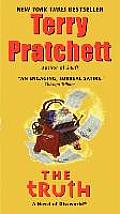 The Truth
by Terry Pratchett
The Truth
by Terry Pratchett
I consider The Truth by Terry Pratchett essential reading. This is a standalone masterpiece that digs into the nature of telling stories, of finding the truth to the universe, and digs into what it means to be a reader and a writer. And I absolutely love it and recommend it to everyone.
÷ ÷ ÷
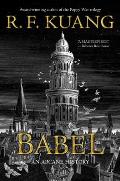 Babel, or the Necessity of Violence: An Arcane History of the Oxford Translators’ Revolution
by R. F. Kuang
Babel, or the Necessity of Violence: An Arcane History of the Oxford Translators’ Revolution
by R. F. Kuang
A very recent one, but I already consider Babel, or the Necessity of Violence: An Arcane History of the Oxford Translators’ Revolution by R. F. Kuang to be a masterpiece of speculative fiction. Bristling with historical detail, Babel begins in 1828, when a boy is orphaned in Canton and brought to London to train in Chinese, Latin, and Ancient Greek — all so he can enroll at the prestigious Royal Institute of Translation in Oxford, colloquially known as Babel. His love for life at the university, and the close friends he makes there, soon comes into conflict with the realization that continuing his studies will cause him to betray his motherland — for Babel is the beating heart of the British Empire, fueling its expansion through silver working, a magic that requires the acquisition of languages.
Babel is at once a compelling bildungsroman and a steely dissection of empire, with a magic system unlike any I’ve encountered before, rooted in etymology and the distortion of words in translation. Kuang is no stranger to handling painful subjects with aplomb — her debut The Poppy War sheds a stark and vital light on the Nanjing Massacre and Unit 731 — and with Babel, she masterfully strips the veneer from the British Empire, the crimes of which have been obscured for many years. This is a magnificent book about sacrifice, complicity, power, and privilege, and I hope it finds its way onto many readers’ shelves.
÷ ÷ ÷
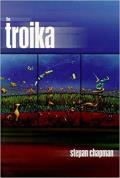 The Troika
by Stepan Chapman
The Troika
by Stepan Chapman
I’m going to be obscure and say Stepan Chapman’s Philip K. Dick Award-winning The Troika. It breaks every rule in the book about writing and succeeds amazingly well in telling the fractal story of a strange trio lost in the desert of another world. By traveling back and forth in time, you learn their stories, and those stories are epic, strange, lyrical, and like nothing else in literature. There is quite a bit of focus on the surveillance state and on environmental devastation. Few novels are as brutal, as compassionate, and as surreal as The Troika. (Full disclosure — my own publishing company released The Troika originally in the 1990s.)
÷ ÷ ÷
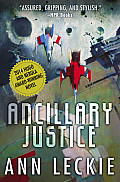 Ancillary Justice
by Ann Leckie
Ancillary Justice
by Ann Leckie
It's hard to narrow down to just one, but I want to say Ann Leckie's Ancillary Justice. Aside from being a great action-adventure SF novel about fighting an unstoppable empire, it opened mental doorways for a lot of readers about how gender is not an inevitability, but a construction of culture and society. I think the book started a lot of conversations and its critical acclaim and popularity made possible the explorations and examination of gender in the new generation of science fiction and fantasy that followed it.
÷ ÷ ÷
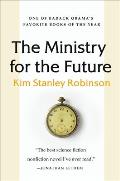 The Ministry for the Future
by Kim Stanley Robinson
The Ministry for the Future
by Kim Stanley Robinson
This may be an obvious choice, but it bears repeating: Kim Stanley Robinson's The Ministry for the Future is a must-read. It dares to imagine a successful response to the climate crisis, not by positing a miraculous new technology, but by showing what the global community could actually do if it were galvanized into action. It's a powerful example of the novel as political activism.
÷ ÷ ÷
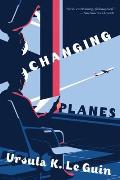 Changing Planes
by Ursula K. Le Guin
Changing Planes
by Ursula K. Le Guin
Changing Planes is perhaps my all-time favorite comfort read, but it’s also a brilliant demonstration of how stories do not have to stick to a traditional plot structure in order to be captivating. Most of the stories in this book could be described simply as proof-of-concept for a wide array of alien cultures. You get a taste of who these people are, then move smoothly onto the next. There’s no build, there are no stakes, there’s no climax or denouement. It’s just (“just,” I say, as though this book isn’t masterful) a beautiful collection of portraits of different societies and worlds. To me, it's an essential read because Western storytelling is incredibly mired in these very rigid, ivory-tower ideas of how a story must be structured. It makes me grind my teeth, seeing how many writers get hamstrung by that. Changing Planes breaks all the rules, and they’re rules that need to be broken.
÷ ÷ ÷
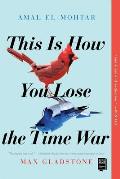 This Is How You Lose the Time War
by Amal El-Mohtar and Max Gladstone
This Is How You Lose the Time War
by Amal El-Mohtar and Max Gladstone
This Is How You Lose the Time War plays with form and timeline and reader expectations in a way that I think few novels have ever attempted, let alone accomplished, and the experience of reading it is something that can change you a little, if you let it.
Good literature does not have to change you; sometimes it comforts you or affirms you or simply gives you something fascinating to look at. However, This Is How You Lose the Time War is a work that invites you in and asks you to ask questions about the nature of love and time and how long a lifetime can be and how short it always is.
÷ ÷ ÷
We know you’re hungry for more! Be sure to check out our full Essential List as well as the 25 honorable mentions we wish we could’ve included.
|